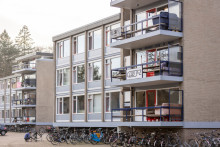20 million euros from the project will go to the UT. In what way will that money used?
'Of the 72 million euros that will be made available for the region, 20 million euros will go to the UT up to and including 2030. It is welcome money for the UT, in financially challenging times. We focus on educating more students, improving the lifelong learning offering and setting up a Semicon Learning Center. The plan is for this centre to be located on campus, where students, lateral entrants and employees of companies work together on research and education.'
'We take on many of the activities as a region. So we are working together with Saxion, ROC van Twente, Twente Board and the industry. The crux of Beethoven lies in the question: what does the industry need? One answer to this is to educate talent for the chip technology sector. A lot is already happening in Twente in this sector, but it was still less focused on the talent issue. To realise the ambitions that are there, you need people.'
The UT plans to educate more than four hundred additional students for the chip tech sector. Since students don't grow on trees, how is the university going to do that?
'The forecasts of the programmes do not come out of the blue, they have been well thought out in the run-up to the plans. However, there are challenges when you look at the recruitment of students, especially those of international students – with the Internationalisation Act in Balance. Nevertheless, Beethoven's financial resources offer opportunities for study programmes to focus more on recruitment activities. But also, for example, to look at admission requirements, improving the transfer to master's programmes, making master's tracks more in line with the industry’s needs and setting up initiatives such as guaranteed internships and housing.'
'It will not be the case that these millions radically overhaul everything. It is intended to strengthen ongoing initiatives' - Leontien Kalverda
The UT will already receive 1 million euros this year for the implementation of the plans. Are we already going to notice this?
'We are mainly still in a start-up phase. I started as a program manager last February, and the program managers at Saxion and ROC van Twente have recently been appointed. The main thing now is to map out all the initiatives that are already underway and then strengthen them. Slowly there will be more mass and visibility. For example, we want to focus on student recruitment through a summer school in Southeast Asia. The summer school here on campus, with chip tech as its theme in 2026, also offers opportunities.'
Project Beethoven in facts and figures
- The government is investing more than 2.5 billion euros in the Dutch microchip sector until 2030
- This after ASML threatened to leave the Netherlands after signals about the brake on the influx of international talent
- Of that 2.5 billion euros, 450 million euros is intended for the education of about 33 thousand extra technical talent
- By far the most money goes to the Eindhoven region. The Twente region will receive 72 million euros
- Of that 72 million euros, 20 million euros is intended for the UT
- The UT wants to educate more and more technical talent step by step, according to the plan. This should start with 43 extra students by 2025, rising to (a total of) 444 extra students by 2030
- In the following years, 86 extra technical students must enter a study programme every year and 80 extra graduates must enter the labour market
And in the years to come, to what extent will Beethoven set the tone at the UT?
'Chip technology is one of the impact domains of the UT, so we will undoubtedly see that focus reflected in the profile of the university. It will not be the case that these millions radically overhaul everything. It is intended to strengthen ongoing initiatives. Not only in the study programmes, but in the field of lifelong learning, for example. Many good things are already happening in that area and money is available for this through the LLO Catalyst. Then the question is: how can we use the Beethoven resources to tap into this and serve the regional chip tech industry as well as possible?'
Where do you foresee challenges?
'Time. People are already very busy. As a program manager, I can facilitate and coordinate it, but I don't carry out the projects. In any case, people are very positive, the will is there and there are many opportunities. Moreover, the money is also there to capitalize on those opportunities. But time – and priority – is always the big challenge.'
When can you speak of success?
'We are not judged on the number of students we allow to enrol. Of course we see that as a performance indicator, but the Netherlands Enterprise Agency evaluates us based on the activities we undertake. It is a success when we carry out these activities well and bring in more talent in the process. I am particularly curious about how we can tackle the talent issue together with the other regional partners – the educational institutions, the industry and the Twente Board.'






